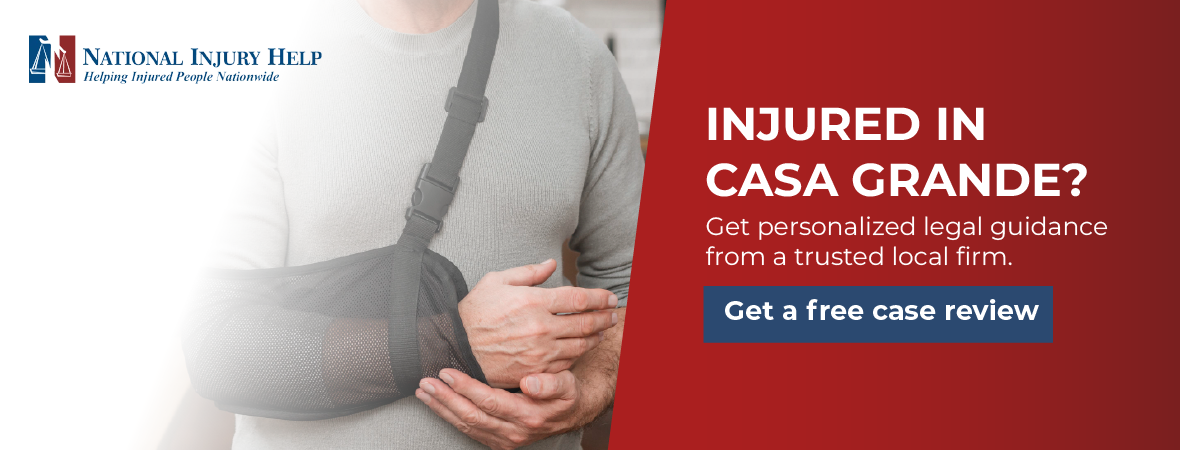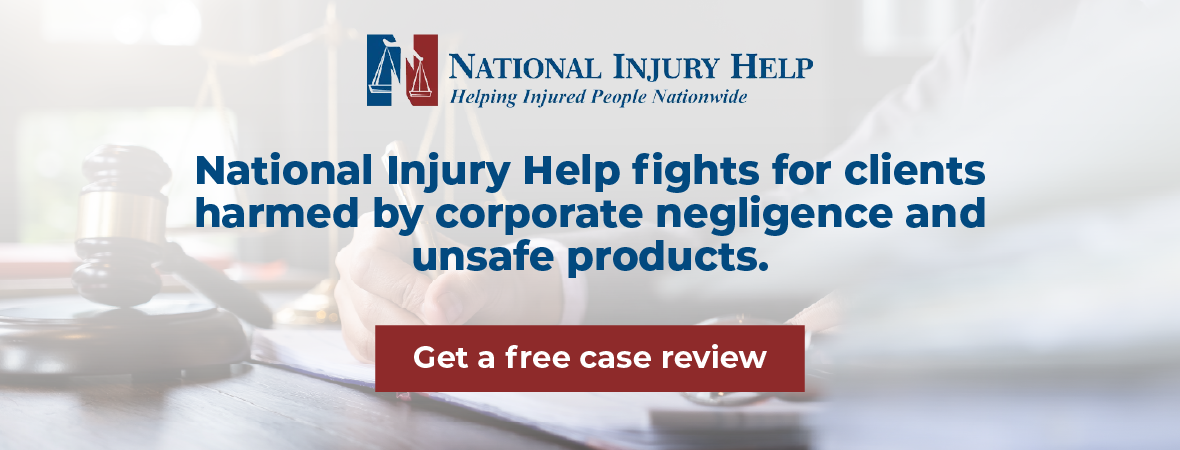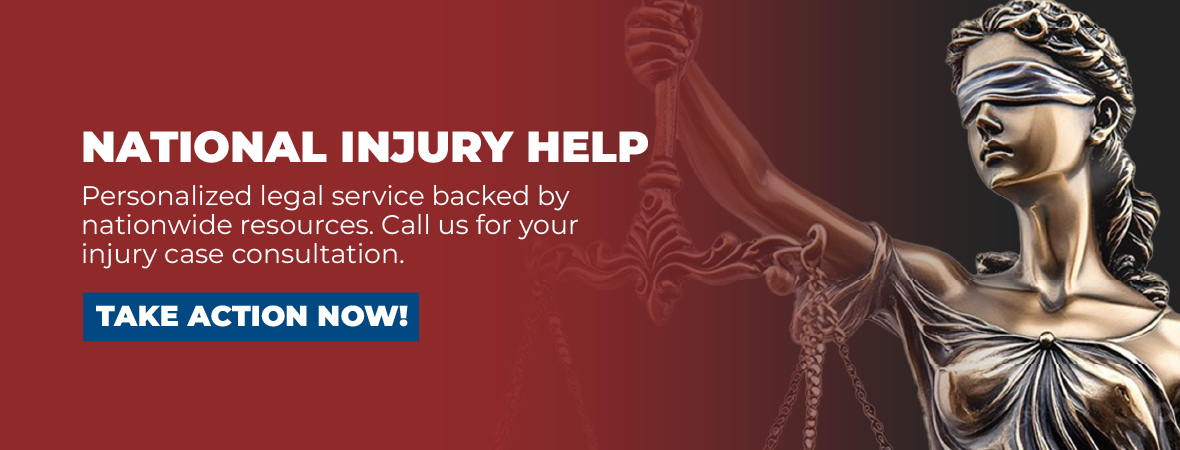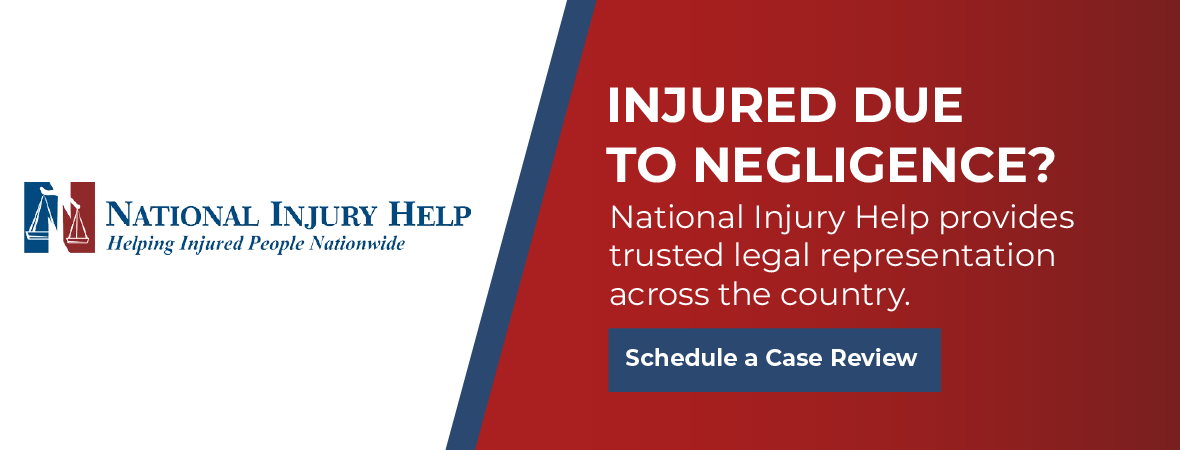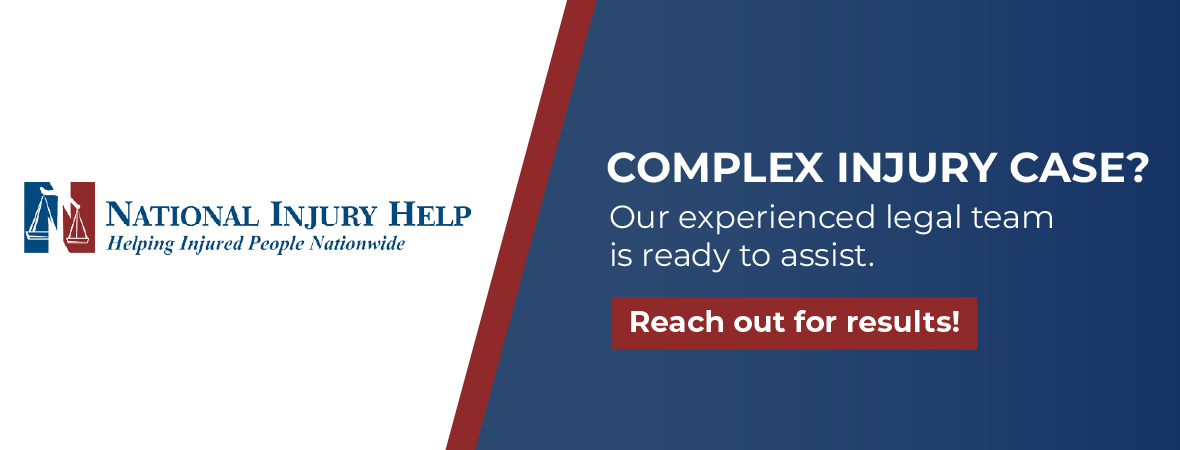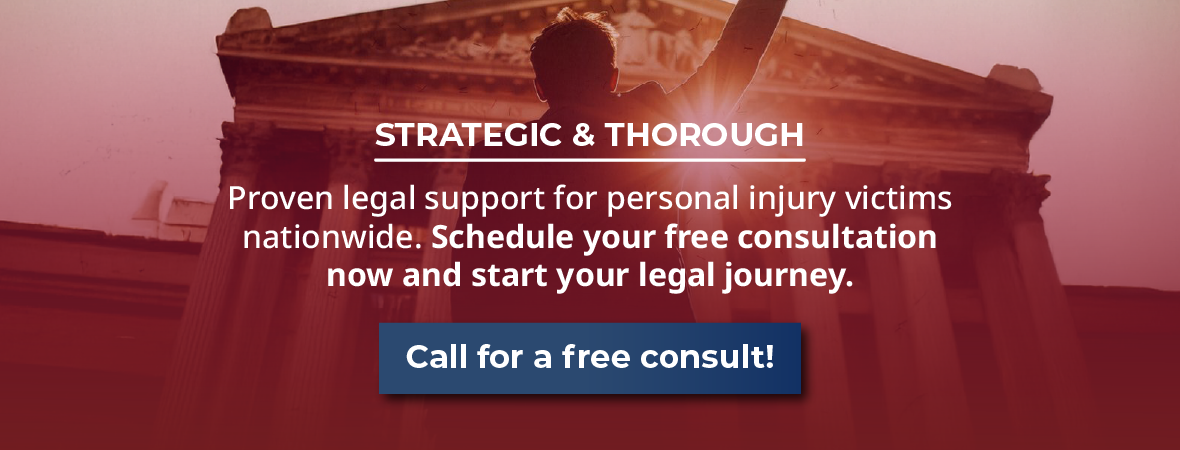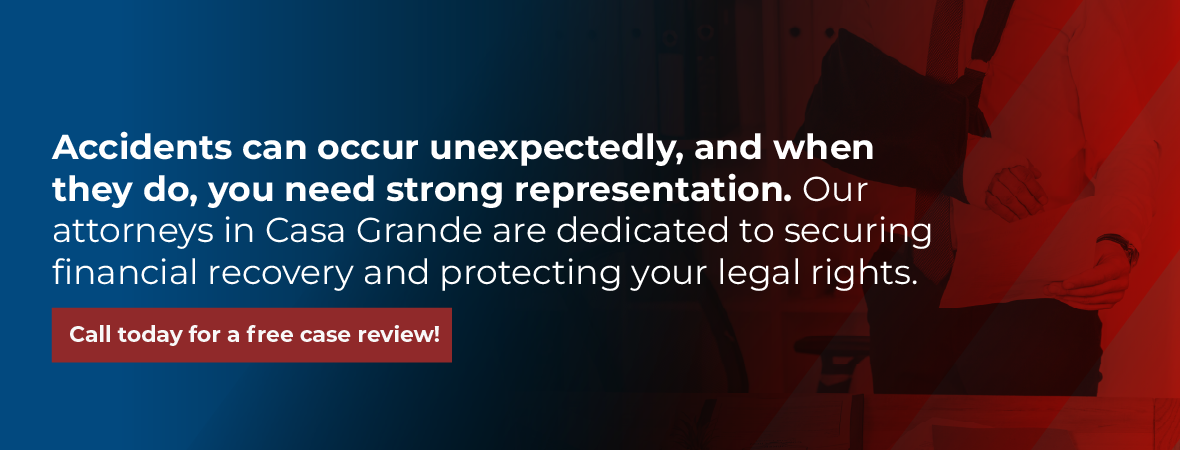If you were injured in an accident in Casa Grande, you may be dealing with medical bills, pain, and stress. Contact National Injury Help today by calling 1 (800) 214-1010. We are here to protect your rights and support your recovery.
Casa Grande sits at the busy midpoint between Phoenix and Tucson. Trucks roar down I-10, commuters weave along AZ-387, and farm vehicles share narrow rural roads. Construction zones pop up quickly as the city expands. Each of these factors raises the chance of crashes, falls, and other injuries. When someone’s careless act hurts you, Arizona law gives you the right to seek payment for your losses.
A local attorney adds strength to that right because we speak the language of Casa Grande courts, insurers, and medical providers. We know how to help you file your claim, the insurance adjusters’ delay tactics, and the doctors who provide clear medical notes.
On this page, we break down the most common injuries, explain your legal rights, and outline the best next steps.
What Qualifies as a Personal Injury Case in Casa Grande?
Before you decide whether to call a lawyer, it helps to understand whether your situation actually qualifies as a personal injury case. Not every accident leads to a valid legal claim, but many do.
The first step is to know what the law says and what types of situations are commonly covered. Once you understand the basics, you can decide if reaching out for help is the right move for you or your family.
The Legal Definition of a Personal Injury Case
A personal injury case exists when someone else’s careless, reckless, or intentional actions cause harm to another person.
The legal term for carelessness is negligence. In simple terms, negligence means someone failed to act the way a reasonable person would in the same situation, and that failure caused injury or loss.
To bring a successful personal injury claim, your lawyer must show four things:
- Duty of care: The other party had a responsibility to act safely. For example, a driver must follow traffic laws. A store must keep its floors clean and free of hazards.
- Breach of duty: That person or company failed to meet their responsibility.
- Causation: Their actions (or inaction) directly caused your injuries.
- Damages: You suffered losses, medical bills, lost wages, pain, or property damage.
Once these four parts are proven, you can pursue compensation for those losses.
Common Types of Personal Injury Cases in Casa Grande
Personal injury claims can take many forms. If someone’s mistake or dangerous behavior caused you to suffer an injury, there is a good chance your situation qualifies. Here are some of the most common examples we see in Casa Grande and the surrounding areas:
Motor Vehicle Accidents
One of the most common reasons people contact us is because of car, truck, or motorcycle crashes. The roads around Casa Grande, especially I-10 and AZ-387, see a steady flow of high-speed traffic and frequent accidents.
Rural roads without proper lighting or shoulders add to the risk. If a distracted, speeding, or drunk driver caused your crash, you may have a personal injury claim.
Slip-and-Fall and Other Premises Liability Claims
Many injury cases happen on someone else’s property. These are known as premises liability claims. For example, you might slip on a spilled drink in a grocery store aisle, trip over a broken step at a hotel, or fall because of an uneven sidewalk outside a restaurant.
Property owners have a legal duty to keep their premises reasonably safe. If they ignore hazards or fail to make timely repairs, they can be held responsible for your injuries.
Dog Bites and Animal Attacks
Dog bites are more common than most people realize, and they can cause serious injury, especially for children or seniors. Arizona follows a strict liability rule for dog bites, which means the owner is usually responsible, even if the dog had never shown aggression before.
If you were bitten by a dog in a public place or while lawfully on private property, you may be entitled to compensation for medical treatment, scarring, emotional trauma, and other damages.
Bicycle and Pedestrian Accidents
Casa Grande has many areas where lighting is poor, bike lanes are missing, or sidewalks are narrow. When you add speeding or distracted drivers to the mix, it creates a dangerous environment for cyclists and pedestrians.
If you were hit by a car while walking or biking, you could have a valid claim against the driver. These cases often result in serious injuries, including broken bones, head trauma, and internal injuries.
Medical Malpractice and Nursing Home Neglect
Some personal injury cases happen in hospitals or long-term care facilities. These are more complex because they involve medical records, professional standards, and expert opinions.
Examples include:
- A doctor misdiagnoses a serious illness
- A nurse giving the wrong medication
- A caregiver ignoring bedsores or signs of infection
If a medical professional fails to provide proper care and that failure causes harm, you may have a malpractice or elder neglect case.
Wrongful Death Cases
Tragically, some accidents result in death. When a loved one is lost due to another person’s carelessness, surviving family members can file a wrongful death claim. This allows families to seek compensation for:
- Funeral and burial expenses
- Medical bills leading up to the death
- Lost financial support
- Loss of companionship and guidance
Wrongful death claims are some of the most emotionally difficult, but they also provide critical financial support during a time of deep grief.
When You May Have a Valid Case
You likely have a claim if you suffered physical, emotional, or financial harm and someone else was even partly at fault. A quick free consultation lets us confirm the details, gather proof, and explain your options in plain language.
What to Do Immediately After an Accident
The moments following an accident are confusing and often frightening. Your heart may be racing. You may be in pain or unsure if anyone else is hurt. You might feel a wave of panic as you try to figure out what just happened and what to do next.
Here’s a simple checklist of what to do after an accident so you can stay calm, stay focused, and protect both your health and your right to compensation.
1. Get Medical Care Right Away
Your health is always the top priority. If you are seriously injured, call 911 or ask someone to call for you. Emergency medical responders will assess your condition and take you to the nearest hospital if needed.
Even if you feel okay at first, it is still important to see a doctor as soon as possible. Some injuries take hours or even days to show symptoms. Whiplash, concussions, and internal injuries are just a few examples of conditions that may seem minor at first but become serious later.
Getting medical care right away does two important things:
- It ensures your safety and well-being.
- It creates a written medical record that connects your injuries to the accident.
That medical record becomes key evidence in a personal injury claim. Without it, an insurance company might argue that your injury came from something else, or that it is not as serious as you say.
In Casa Grande, you might go to Banner Casa Grande Medical Center, a local urgent care clinic, or your family doctor. The important thing is to be seen by a licensed medical professional and to follow all their instructions for treatment and follow-up.
2. Report the Incident
Accidents need to be officially reported. A formal report provides proof that the incident happened when and where you say it did. It also creates a record of who was involved, what conditions were like, and what actions were taken at the scene.
For Car Accidents
Call the police right away, especially if anyone is hurt or the vehicles are damaged. When officers arrive, they will create a police report that includes:
- Names and contact information for all drivers and passengers
- Insurance details
- Vehicle descriptions
- Witness statements
- A summary of how the crash happened
- Road and weather conditions
Be sure to ask how you can get a copy of this report. You may need it later.
For Slip and Falls, Dog Bites, or Other Incidents
If you were injured on someone else’s property, notify the manager, owner, or supervisor immediately. If it happened at a business, ask to speak with the store manager. If it was a dog bite, report it to the local animal control office.
Ask them to complete an incident report and provide you with a copy or confirmation that one was made. If they refuse, write down the time, place, and name of the person you spoke with. This step prevents the property owner from later claiming that the accident never happened.
3. Gather Evidence at the Scene
Photos and other physical evidence can be powerful tools in proving your case. As long as it is safe to do so, try to collect the following at the scene:
- Photos of the area: Include wide shots and close-ups of what caused the accident, such as broken stairs, spilled liquid, or skid marks on the road.
- Photos of injuries: Bruises, cuts, swelling, and other visible signs of trauma should be photographed as soon as possible.
- Photos of property damage: This might include your car, your clothing, broken glasses, or a torn bag.
- Witness information: Ask for names and phone numbers of anyone who saw what happened. Their testimony may help if your version of events is challenged.
- Physical evidence: Save any clothing, shoes, or personal items damaged in the incident. These items can support your story.
You do not need to be a professional investigator. Just take clear photos and notes using your phone. The more documentation you have, the easier it will be to explain what happened later.
4. Avoid Common Mistakes That Can Hurt Your Case
Many people make innocent mistakes after an accident that end up hurting their case. Avoiding these common errors can protect both your health and your legal claim:
- Do not say you are sorry: It is human nature to apologize, even when something is not your fault. But the other side could take your words as an admission of guilt. Stick to the facts.
- Do not accept blame: Let the investigation determine who was responsible. Avoid saying things like “I wasn’t paying attention” or “It was probably my fault.”
- Do not delay medical care: Waiting too long to see a doctor may give the insurance company a reason to doubt your injuries. Go to the doctor, follow their advice, and keep all follow-up appointments.
- Do not give a recorded statement to insurance without legal advice: Insurance adjusters may ask to record your story “just to understand what happened.” This can be risky. They may try to twist your words or get you to downplay your pain. Always speak with a personal injury lawyer before giving any detailed statement.
How Negligence and Fault Work in Arizona
You have heard the word negligence, but what does it mean in practice?
Legal Definition of Negligence
Arizona courts look for four parts: a duty to act carefully, a breach of that duty, a direct link between the breach and your injury, and measurable damages like bills or lost wages. We collect evidence for each element so nothing is left to chance.
Arizona’s Comparative Negligence Rule
Even if you share some fault, you can still recover money. The court reduces your award by your percentage of blame. For example, if you slip in a grocery store while glancing at your phone and you are deemed 20 percent at fault, you still receive 80 percent of your total damages.
Shared Fault and Insurance Implications
Insurance companies love to inflate your share of blame. We push back with photos, expert opinions, and witness statements. Lowering your percentage means more money in your pocket.
How a Casa Grande Personal Injury Lawyer Can Help You
At first, it might seem like you can handle everything on your own. You’ve been in an accident or hurt due to someone else’s mistake, and you figure a few phone calls to the insurance company and a couple of forms will be enough.
But before long, things get complicated. The phone rings constantly, bills arrive faster than you can pay them, and insurance companies start asking questions that feel loaded. Meanwhile, the pain from your injury hasn’t gone away, and now stress is keeping you up at night.
This is where a Casa Grande personal injury lawyer can step in and make all the difference. We take the pressure off your shoulders so that you can focus on healing. From the first phone call to the final outcome, whether it’s a settlement or a court verdict, we guide you through every step of the process.
Free Consultation and Case Evaluation
Our first conversation is free. There is no pressure, no payment, and no strings attached. You tell us your story: what happened, how it happened, and how your life has changed since the injury.
We listen carefully and ask questions to understand all the important details. Then we explain your legal options in plain language and give you a clear plan of action. We also go over what kind of compensation might be possible and what to expect in terms of timelines. By the end of the call, you will have a better idea of whether your case qualifies and how we can help.
Investigate the Incident
The strength of your case depends on the quality of the evidence. That is why we begin by investigating the incident thoroughly and quickly. The longer you wait, the greater the risk that important evidence will disappear.
We start by collecting any available video footage. This might come from a traffic camera, gas station, store security system, or even a nearby home’s doorbell camera. These recordings can be powerful proof of what happened, but many systems automatically delete footage within days. That is why our team acts fast.
Next, we order official documents. This includes accident reports, incident reports, and your medical records. These documents create a clear timeline and show how serious your injuries are.
We also look for witnesses. People who saw the accident may be able to provide details that are not in any report. We interview them, take statements, and prepare to use their words to support your claim if needed.
Handle All Insurance Negotiations
Insurance companies are not your allies. Their job is to save money, and they do this by offering low settlements or dragging out the process until you feel desperate enough to accept less.
We step in to protect you from these tactics. Our team communicates directly with the insurance adjusters, so you don’t have to. We present solid evidence, refer to legal precedents, and clearly state what you are owed.
Because insurance companies know we are willing to take the case to court if necessary, they often treat your claim more seriously. If they try to delay or deny the claim, we push back with facts and legal experience on our side.
Calculate All Damages
Your injury may cost far more than just the emergency room visit or the first doctor’s bill. Many people forget to count future expenses, ongoing treatment, and other types of harm. This is where careful calculation matters.
We work with medical experts, financial professionals, and life care planners to create a complete picture of your damages. This includes:
- Hospital and surgery costs
- Physical therapy or rehabilitation
- Prescription medications
- Travel to and from medical appointments
- Lost wages and overtime
- Loss of earning potential if you cannot return to your job
- Pain, suffering, and emotional distress
- Loss of enjoyment of life
- Future care needs, such as in-home help, wheelchairs, or home remodeling
By documenting everything in detail, we prevent insurance companies from downplaying what you’ve gone through. Our job is to make sure your claim reflects the full reality of your loss, not just a small portion of it.
File a Lawsuit If Necessary
Not every case settles. Sometimes, the other side refuses to offer fair compensation. When that happens, we are fully prepared to take your case to court.
If we need to file a lawsuit, we handle everything. We draft the legal complaint, file it in Pinal County Superior Court, and follow every rule and deadline. We guide you through all stages of litigation, including:
- Pre-trial hearings and motions
- Discovery, where we gather more evidence
- Depositions, where witnesses answer questions under oath
- Mediation, where both sides try to reach a resolution
- Trial, if no agreement is reached
We always explain every step in everyday language. You won’t be left in the dark or unsure of what is happening. We believe in honest communication, so you always know where your case stands and what your options are.
What Compensation Can You Recover in Casa Grande Injury Claims?
After an accident, many people feel overwhelmed. Pain, medical bills, time off work, and emotional stress can turn life upside down in a matter of seconds. If you were hurt due to someone else’s carelessness, you may have the right to seek compensation.
These fall into three main categories: economic damages, non-economic damages, and, in rare cases, punitive damages.
Economic Damages
Economic damages are the measurable costs that come from your injury. These are typically supported by bills, receipts, or pay stubs. They are the foundation of most personal injury claims and are meant to return you, as much as possible, to the financial position you were in before the accident.
Medical Expenses
This is often the largest part of any claim. Medical expenses include every treatment and service needed to diagnose, manage, or recover from your injury. Some examples include:
- Ambulance or emergency transportation
- Emergency room visits and hospital stays
- Surgeries and anesthesia
- Imaging tests like X-rays, MRIs, or CT scans
- Prescription medications
- Physical therapy or rehabilitation
- Chiropractic care
- Follow-up doctor visits and ongoing treatment
- Medical devices like crutches, braces, or wheelchairs
Even if you have health insurance, out-of-pocket costs can add up fast. And if your injury will require care in the future, such as follow-up surgeries, long-term therapy, or specialist visits, your lawyer can include those projected costs as well.
Lost Wages and Loss of Earning Capacity
When you are injured, you may be forced to miss work for days, weeks, or even months. In some cases, people can never return to the same job again. That is why compensation for lost income is so important. This includes:
- Pay you missed while recovering
- Sick days or vacation days, you had to use
- Missed overtime or bonuses
- Lost tips or commissions, if you work in a field like food service or sales
If your injury affects your long-term ability to work, like needing to switch careers or move to part-time, you may also be entitled to loss of earning capacity. This accounts for the difference between what you could earn before the injury and what you can earn now.
Property Damage
If your vehicle or personal belongings were damaged in the accident, you can be compensated for that too. For example:
- Car or motorcycle repair or replacement
- Damaged phones, laptops, glasses, or jewelry
- Child safety seats or other items affected in a crash
Every piece of damage matters. A skilled attorney will help document all of it so you are not left covering the costs alone.
Non-Economic Damages
Not all injuries can be seen on a medical scan or totaled up on a bill. Some of the worst effects of an accident are personal, emotional, or relational. These are known as non-economic damages, and while they are harder to measure, they are just as real.
Pain and Suffering
This type of compensation is for the physical pain you experience from your injuries. Whether it is sharp, constant pain from a broken bone or long-term soreness from soft tissue damage, pain impacts your quality of life. Compensation acknowledges how this pain changes your day-to-day routine.
Emotional Distress
Accidents are traumatic. It is common for injury victims to suffer from anxiety, depression, fear of driving, nightmares, or trouble sleeping. If your emotional or mental health was affected by the accident, you can seek compensation for that too. Often, counseling or medication is needed to help manage these effects.
Loss of Enjoyment of Life
Some injuries take away the ability to enjoy your favorite activities. Maybe you can no longer go hiking, play with your children the same way, attend social events, or travel without discomfort. This type of damage recognizes that your life has been permanently changed and that joy has been replaced by limitations.
Loss of Companionship or Support
In more serious cases, injuries affect your relationships with your spouse or children. If your marriage or family life has changed, physically, emotionally, or socially, due to the injury, these losses may also be included in your claim.
Punitive Damages
Most personal injury claims focus on compensating the victim. But in rare cases, the court may also award punitive damages.
These are not about paying back losses. Instead, they are used to punish someone for extreme or reckless behavior and to send a message that this kind of conduct will not be tolerated.
Examples that may justify punitive damages include:
- Drunk or drugged driving that leads to a crash
- A company knowingly selling a dangerous product
- A property owner ignoring repeated safety complaints
- A driver engaging in road rage or intentionally causing harm
Punitive damages are not guaranteed and are only awarded when the behavior goes far beyond simple carelessness. However, if your case involves this level of wrongdoing, your lawyer can push for this additional form of accountability.
How Long Do You Have to File a Personal Injury Claim in Arizona?
Time limits can make or break a claim.
Standard Statute of Limitations
You usually have two years from the injury date to file suit. Miss that window, and the court can dismiss your case, no matter how strong the facts.
Shorter Deadlines for Government Claims
If a city, county, or state agency caused your injury, you must serve a formal notice of claim within 180 days and file the lawsuit within one year. We handle the extra paperwork so deadlines never slip by.
Importance of Acting Quickly
Evidence fades and memories blur. Surveillance videos get taped over, skid marks wash away, and witnesses move. Early action secures proof and strengthens your negotiating position.
FAQs About Personal Injury in Casa Grande
We receive many recurring questions. Here are clear answers that may help you now.
How much does it cost to hire a personal injury lawyer?
You pay nothing upfront. We work on a contingency fee basis, usually around one-third of the recovery. If we win nothing, you owe nothing.
What if I was partly responsible for my injury?
Arizona’s comparative negligence rule still lets you collect money, even if you were partially responsible for your injury, though the amount will be reduced by your percentage of fault.
Can I still sue if I did not get medical treatment right away?
Yes, you can still sue if you did not get medical treatment right away, but delays can weaken the link between the accident and your injuries. See a doctor as soon as possible, then call us.
What if the other party does not have insurance?
If the other party does not have insurance, we look for other coverage, like your uninsured-motorist policy, the at-fault party’s personal assets, or third-party defendants such as employers or property owners.
How long will my case take?
Straightforward claims may settle in a few months once you finish treatment. Complex or heavily disputed cases can take a year or more, especially if they go to trial. We keep you updated at every stage so you can be aware of how long your case may take.
Contact a Personal Injury Attorney in Casa Grande
You now know the steps, the deadlines, and the possible compensation available after an accident in Casa Grande. The next move is simple. Reach out to National Injury Help today. We serve clients across Casa Grande, Eloy, Coolidge, Arizona City, and Maricopa.
You pay nothing unless we win. Your consultation is free, your questions are welcome, and your peace of mind is our top priority. Do not let evidence fade or deadlines pass. Contact 1 (800) 214-1010 today, and together we will fight for every dollar of compensation you deserve.






